23 May 2014 | Europe and Central Asia, News and features, Ukraine
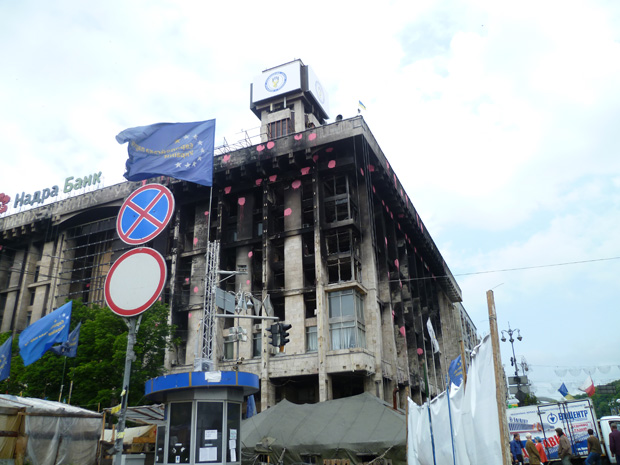
(Image: Index on Censorship)
Ukraine is seeing a “concerning pattern of grave violations of media freedom commitments” warns OSCE press freedom boss Dunja Mijatovic in a new report.
“As we know too well, in times of crisis and conflict, journalists and members of the media are among the first to be attacked, both physically and psychologically. Because those in power during periods of conflict demand complete control of all information free media is often their first target,” the report, published on Friday, states. Covering the time between 28 November 2013 and 23 May 2014, these are the three key findings.
1) Journalists face serious threats to their safety
There have been “nearly 300 reported cases of violence against journalists, including murder, physical assaults, kidnappings, threats, intimidations, detentions, imprisonments, and damage and confiscation of equipment”. These attacks are divided into two phases — the first covering the Maidan protests in Kiev, and the second the ongoing crisis in the east of the country. In Maidan, journalist Viacheslav Veremyi was killed, while almost 200 others were victims of violence. These include the over 40 journalists who were assaulted while covering protests on 13 December 2013. “In some cases,” the report states, “journalists were specifically targeted by law enforcement despite displaying clear identification as members of the press.” Since March, attacks on journalists in the east have intensified and gone without prosecution — something that “points to the breakdown of the rule of law in the parts of Ukraine affected by conflict”. On 18 May, Ukrainian military arrested two Russian journalists from LifeNews, while two journalists from Otkritiy Krymskiy Kanal were detained, interrogated, beaten and had their equipment seized by a group of people wearing military uniforms. Journalists in Crimea — recently annexed by Russia — who are not considered loyal to the region’s authorities, and who refuse to change citizenship, have been faced with regular threats, harassment and the possibility of eviction.
2) Ukraine is in the middle of an information war
There have been a number of accusations of the media being used to disseminate propaganda. “Propaganda and the deterioration of media freedom combine to fuel and contribute to the escalation of conflict, and once it starts they contribute to its escalation,” the report states. Among other thing, broadcasting stations “and related infrastructure” in Crimea, Sloviansk, Donetsk and Luhansk, have been attacked by unidentified and often armed individuals who supplanted regularly scheduled television programming with Russian state media. In March, the National Television and Radio Broadcasting Council of Ukraine ordered all cable operators to stop broadcasts of several Russian state TV channels. “No matter how loud and outrageous certain voices are, they will not prevail in a competitive and vibrant marketplace of ideas,” the report argues. “Therefore, any potentially problematic speech should be countered with arguments and more speech, rather than engaging in censorship.”
3) Media workers are being denied entry
In the past months, the OSCE has intervened in some 30 cases of journalists being denied entry into Ukraine and Crimea. “I have serious concerns about excessive restrictions on such travel, which ultimately affects the free flow of information and free media,” writes Mijatovic. Recently, Russia Today’s Arabic news crew, who travelled to Kiev to cover Sunday’s presidential election, were denied entry at immigration. Two crews from the All-Russia State Television and Radio Broadcasting Company (VGTRK) were not allowed to enter Ukraine, despite having all required accreditations. On a related note, a Rossiya-1 TV crew were this week deported from Ukraine.
This article was posted on May 23, 2014 at indexoncensorship.org
23 May 2014 | News and features, Pakistan, Politics and Society, Religion and Culture
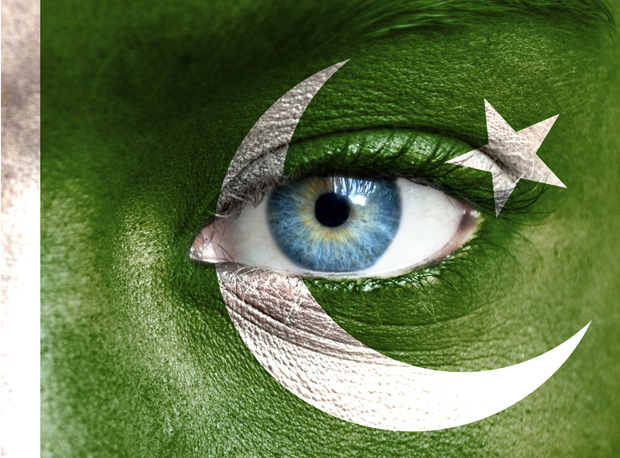
(Image: Aleksandar Mijatovic/Shutterstock)
Shahidullah Afridi’s roots are in a village in the Bara administrative division of the Khyber agency. For the last four years, Afridi has been living in the neighbouring city of Peshawar, but keeps a keen eye on events at home.
He was shocked when he heard that last week, the outlawed militant group, Lashkar-e-Islam (LI) had started a rather strange recruitment drive in his village that asked residents to enrol at least one of their sons to madrassas run by LI or pay Rs 400,000 (£2,397.96) as penalty.
Afridi is glad he left when he could. “I have a five-year old son. I don’t want my son to study in a madressa. I didn’t and I consider myself a fairly good Muslim,” he said, adding: “If you don’t study in a school [as opposed to a madressa], you don’t find work.”
The news was confirmed by Zahir Shah Sherazi, Dawn TV’s bureau chief in Peshawar who also reports on FATA and KPK. “My sources tell me that A4 sized posters have been plastered all over the marketplace in the Malik Din Khel area, controlled by LI, demanding locals put their sons into the seminaries run by them,” he told Index, adding: “They also said admission in madrassas other than theirs would not be acceptable.”
Afridi has not visited his village since he left. “I neither sport a beard nor do I wear a skull cap,” he told Index by phone from Peshawar, where he works as a daily wage earner.
Ambreen Agha, a research assistant with New Delhi’s Institute for Conflict Management, said Mangal Bagh assumed the leadership of LI in 2007, emerging as a new face of extremism and Islamic fundamentalism. “He imposed his version of the Shariah, issuing diktats against women’s education, making it compulsory for men to keep beards and forced women to wear burqa.”
Neither the Pakistani government nor the army took any actions.
“It shows the incompetency of the establishment,” said Agha, adding: “Eight years of Bagh’s control of the area says enough about the will of the Pakistani state in dealing with the militants. ”
To Farahnaz Ispahani, public policy scholar with the Washington D.C. based-Woodrow Wilson Centre and a former parliamentarian, it’s a “reflection of the virtual end of pluralism and choice in Pakistan”.
“Extremist ideology has partnered with criminality; the so-called Lashkar-e-Islam is engaging in mafia-like extortion but seeking respectability as an Islamist insurgent group,” she told Index.
Sherazi terms Bagh a “criminal” adding that his is not an ideological fight. “He is just doing business — in drugs,” he said.
Journalist Taha Siddiqui, winner of this year’s Albert Londres Prize, has travelled extensively in the area controlled by Bagh as well as written about militancy. Siddiqui told Index: “Locals that I have spoken to tell me that the smuggling trade from Bagh’s area is most lucrative.”
But why has the state allowed Bagh to flex his muscles with such impunity?
Khyber agency is on the last leg of the NATO supply route before it enters Afghanistan. Siddiqui says it suits the Pakistani security establishment to keep the area lawless. “It helps to keep it infested with militants — and using the latter as proxies to keep the pressure on NATO when it’s exiting.”
In addition, he said, Pakistan had often hinted at acquiring the leftover military equipment. “What better way to have their way if the ISAF does not cooperate — keep attacking the supply route — and that is only possible if they have proxies there,” he explained.
At another level, Siddiqui said the state is using militancy to achieve some other objectives. “They created Ansar ul Islam [another banned militant group] to counter LI in Khyber agency. To me, it proves that they do not want to eradicate militancy, but keep arming one group to disarm the others, especially those who have turned against them.”
Bagh’s enrolment ultimatum is just another example of how emboldened the militant outfits have become and in comparison how weak the Pakistani state appears.
However, there is time still and if the state is sincere in protecting the next generation of children from embracing militancy, Siddiqui said, the civilian government should ask the military what it has been doing in Khyber agency for almost half a decade. “If it’s fighting militancy, then this should not be the result. On the other hand, if it is not, those responsible should be held accountable and heads should roll so that an effective counter-terrorism policy is actually implemented which is not limited to paying lip-service to gain international sympathy and aid through deceit and cheating that Pakistan has come to be known for.”
This article was posted on May 19, 2014 at indexoncensorship.org
22 May 2014 | Europe and Central Asia, News and features, Politics and Society, Ukraine

(Photo: Milana Knezevic/Index on Censorship)
Walking around Kiev’s Maidan Nezalezhnosti square, months after the protest that enveloped the city and toppled the corrupt government of Viktor Yanukovych died down, is a strange experience. International attention has understandably shifted, the images now beamed across the world are from the ongoing crisis in eastern Ukraine. The capital is calm these days, so I don’t know exactly what I was expecting as I made my way down Mykhailivska street.
Tents still populate Maidan, with young and old lounging, talking and cooking in the May sunlight. I walked past sandbag barricades, and ones made of tyres painted in the blue and yellow of the Ukrainian flag. There were flags were everywhere — EU, American, British, and many more. I walked past the independence monument, juxtaposed against the new year tree, covered by protesters in posters, and yet more flags. Music was blaring out from the small stage facing these towering structures. The lyrics I couldn’t understand, apart from the cry of “Ukraina” in the chorus. I made my way past the Maidan press centre, towards a bridge which had a large banner emblazoned with names and faces hanging from it. The Hotel Ukraina behind me, I looked out over the square.
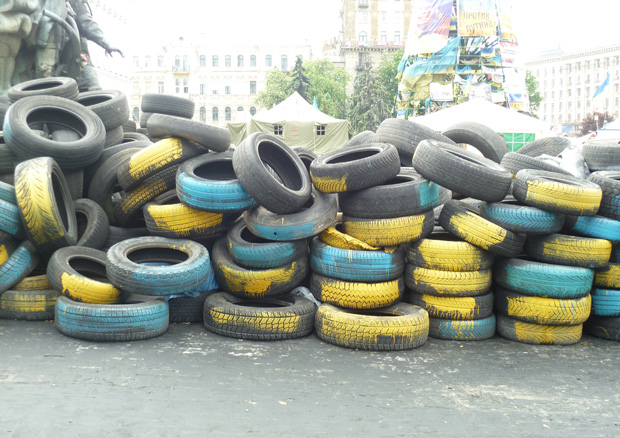
(Photo: Milana Knezevic/Index on Censorship)
The only thing missing was the crowds. It felt like they had just taken a break — gone for lunch, to return at any moment. Perhaps I arrived with a naive “out of sight, out of mind”, mentality, subconsciously assuming that the square would to an extent have been cleared out. But Maidan seems to be, for now at least, a living monument to the profound change, and crisis, Ukraine is going through.
It was against this backdrop, and with the country’s general elections set for this Sunday, I travelled to Kiev to take part in the conference Ukraine: Thinking Together. The brainchild of Yale University history professor Timothy Snyder and the New Republic’s Leon Wieseltier, its purpose was “to meet Ukrainian counterparts, demonstrate solidarity, and carry out a public discussion about the meaning of Ukrainian pluralism for the future of Europe, Russia, and the world.” The guest list included academics like Bernard-Henri, Lévy Timothy Garton Ash and Ivan Krastev, and journalists like The New York Times’ Roger Cohen and The Atlantic’s David Frum. Former Swedish prime minister Carl Bildt also made an appearance at the welcome reception.
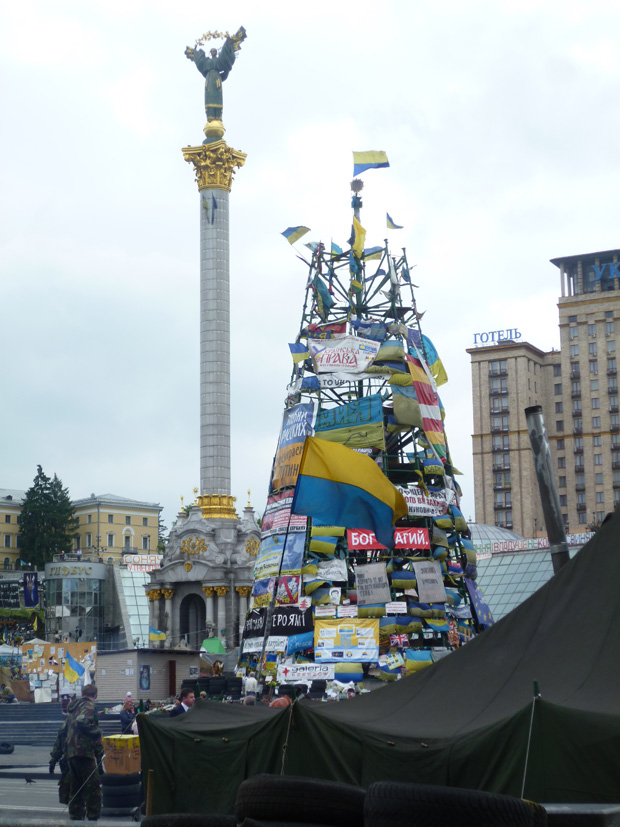
(Photo: Milana Knezevic/Index on Censorship)
One could question what, if any, effect the discussions of a group of intellectuals might have on the very real crisis on the ground. Over the weekend, there were among other things, a Crimean Tartar journalist was detained in Simferopol, while the Ukrainian military arrested two Russian reporters. But Kiev-based journalist Maxim Eristavi told me, and tweeted, that it was “surreal” to have the “intellectual powerhouse of the West in one room in Kyiv”. If nothing else, organising a big-name gathering to talk about Ukraine, in Ukraine, makes a bold statement — and one likely to be heard all the way to Moscow.
A range of topics were tackled in five days of panel debates and public lectures. The Maidan protest was applauded, with Wieseltier in his opening remarks calling it “one of the primary sites of the modern struggle for democracy”. Carl Gershman, President of the National Endowment for Democracy, called Maidan a geopolitical move, but by a people rather than a government.
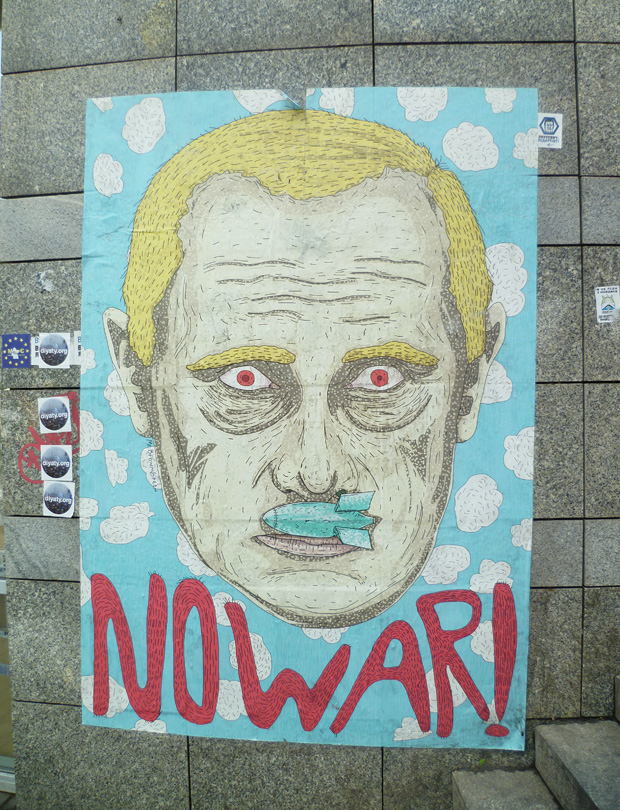
(Image: Milana Knezevic/Index on Censorship)
Bernard-Henri Lévy spoke of his recent visits to eastern Ukraine, explaining that while they might be fewer than in the Maidan, there are people in these areas who support a unified Ukraine. He contested what he believed to be the image presented in western media that people in the east are all separatists. While the point was made that flags, national symbols and the Maidan movement is not perceived as positively in all parts of the country as in Kiev, Constantin Sigov, professor at the National University of Kyiv-Mohyla, argued that the Ukrainian crisis is first and foremost civil and political, not one of identity.
Russia’s foreign policy and Russian President Vladimir Putin were unsurprisingly recurring themes. “He has values. They are not our values, but they are values,” said François Heisbourg, chairman of the International Institute for Strategic Studies, talking on the panel of geopolitics after Crimea. Writer Paul Berman argued, in the same panel, that Putin is acting from a position of weakness, and fear that Russia is not stable. Others, meanwhile, were uncomfortable with the term geopolitics, saying it legitimises Putin’s world view.
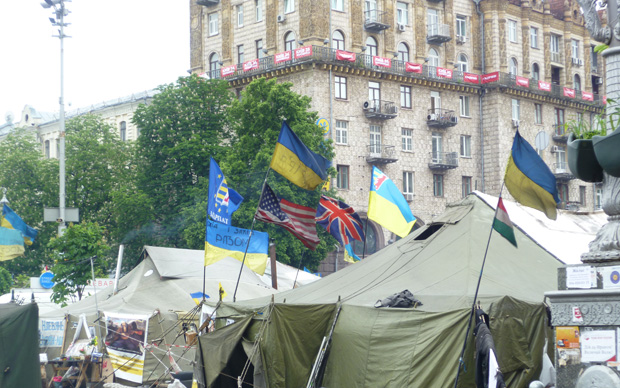
(Photo: Milana Knezevic/Index on Censorship)
Russia’s propaganda strategy was also a hot topic and elicited strong responses, with one audience member referring to it as a weapon of mass destruction. “Propaganda is the beginning of bloodshed, it precedes bloodshed,” said Alexandr Podrabinek, editor-in-chief of Prima information agency, on the panel discussing whether rights make us human. State-run news channel RT, formerly Russia Today, got several mentions. Academic Anton Shekhovtsov argued that RT gives space to democratic consensus in its coverage, but also to left-wing, far right and libertarian narratives, and even conspiracy theories. Because each is treated in roughly the same way, the democratic narrative becomes just one of many. He said this explains why RT appeals to some people in the west, but stressed that they’re pushing an overall Russian agenda.
Podrabinek, despite dubbing RT “hateful”, argued that while there might be a temptation to shut down views we don’t like, this is not a good way of confronting them. If we want freedom of expression, he said, we can’t do that. On a related note, Carl Gersham argued that while Ukraine needs to be supported economically and militarily, they also need support in modernising the media landscape, to foster internal dialogue.
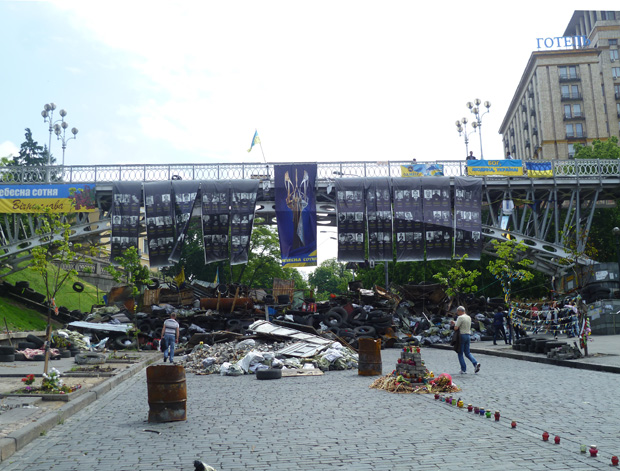
(Photo: Milana Knezevic/Index on Censorship)
And while the regime was criticised by speaker after speaker, ordinary Russians and their rights were not forgotten. Sergei Lukashevsky, director of the Sakharov Museum and Public Centre, put the support for Putin into the context of fear. When people see that the state is cracking down on human rights again, he argued, they make themselves fit in — go into survival-mode. While rights exist formally in Russia, he explained the practical situation through an old Soviet joke: “Do I have the right? Yes. Can I? No.”
In a weekend of intellectuals discussing how to solve a crisis, novelist and non-fiction writer Slavenka Drakulic gave a sobering lecture on the role of intellectuals in causing crises, specifically the Balkan wars. To be able wage war, to kill, you have to create an enemy and dehumanise it, she argued. Here is where academics, poets, journalists came in handy in former Yugoslavia — by preparing people psychologically for conflict, “using words almost like bullets”.
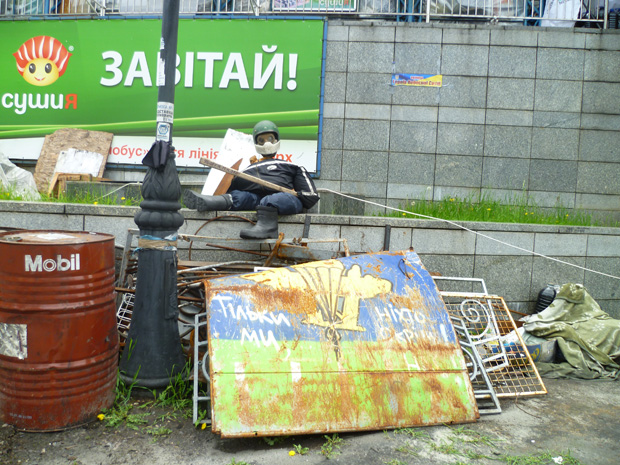
(Photo: Milana Knezevic/Index on Censorship)
And this leads well into the final panel of the conference, on the role of history and memory in politics, the difference between official history and collective and personal memories of the people, and how especially the former can be manipulated. We’re arguably seeing that today already, with Timothy Snyder saying that with events in Ukraine, a European revolution is being contested even as it’s happening. The Russian Ministry of Education is already writing new chapter to explain Crimea, said acclaimed Ukrainian novelist Andrey Kurkov. “And Ukraine might have their version.”
After my trip to Maidan, I asked a Ukraine-based AP journalist what the future might bring for the square. There are only a specific type of people still there, she explained, and they might see how the elections go before they decide to stay or leave.
Or as Myroslav Marynovych, the founder of Amnesty International Ukraine, said during the conference — when there is democracy, there will be no need to go to Maidan.
This article was published on May 22, 2014 at indexoncensorship.org
22 May 2014 | Counterpoint, Digital Freedom, News and features, United States

Graham Ginsberg shows how he feels about his search engine profile. (Photo courtesy Graham Ginsberg)
The internet is so much more significant than a newspaper article. It’s bigger than print in its longevity and reach and it’s forever growing, shaping the public lives for all generations, past, present and future.
The handling of this information has become exponentially important. The quote “With great power comes great responsibility” comes to mind. But where is the responsibility when it comes to showing our personalities, our castle, in search engines?
When search engines choose to show information about me, as an example, do they show all available information about me or do they choose certain articles and pictures they consider most relevant and fresh to show the public? And why is there no redress available to me to deal with how search engines portray me?
I recently submitted a complaint to three major search engines requesting that they remove certain pictures and references to articles about me that were old and irrelevant.
Google didn’t respond back, but Bing’s Technical Support did saying, “Thank you for contacting Bing Technical Support regarding your request to remove content from the Bing search engine. Working directly with the site owner or webmaster for removal of the content is the best way to resolve your issue. Bing doesn’t control the operation or design of the websites we index. We also don’t control what these websites publish. As long as the website continues to make the information available on the web, the information will be generally available to others through Bing or other search services.”
But this isn’t entirely true on several levels. But it’s their boilerplate response back, kind of a “it’s not our fault” statement.
Search engines like Bing, Google and Yahoo, do limit and restrict information they show in search results by using software that prioritizes and sorts data into a format it deems suitable.
What is censorship?
Censorship is the act or censoring, the removal or suppression of what is considered morally, politically, or otherwise objectionable. And this is precisely what search engines do right now in their own way using customised algorithms.
Bing suggested that I contact the webmaster in the hope that they would remove the information from being indexed on the internet. Bing suggests that they remove a story as if it never existed. But that isn’t my gripe. I have no problem that our local daily newspaper has pictures and an article about me protesting in front of their establishment. They have every right to have it and I don’t want it removed from their website.
But I have an issue with Bing for showing the information as if it was the only information there was on me. And there is a ton of information about me; from articles I had written to the local paper on a whole bunch of different subjects from national beach access issues to real estate, but little if any is shown in the search results. Just me standing in front of the paper protesting with a noose around my neck, almost ten years ago. Maybe the algorithms looks for keywords like ‘noose’ and prioritizes them higher than say and article about NBA Hall of Famer Larry Bird and his house, which I contributed last year in the same paper.
Because search engines are moneymaking machines, any customized filtering of search results will cost them dearly. And why not, they’re businesses like any other and should be held accountable for their product they’re selling. But what makes search engines different from any other business is they’re so big and powerful and that is why governments need to have means to force them into compliance.
It’s the Wild West all over again. Asking search engines like Google and Bing to police themselves, to be fair and moral has proven to be futile and why should they care or even act accordingly?
To keep the peace for the common good, laws need to have teeth to force offending search engines to comply with logical guidelines that protect the interests of the public and not just interests of these large search engine corporations.
This article was posted on 22 May 2014 at indexoncensorship.org









